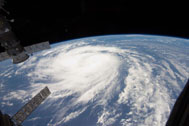
 Cyclone Katia - 01 October 2012
Cyclone Katia - 01 October 2012Copyright : © NASA/, 2012
WELCOME
Second Announcement and call for abstracts
International Conference on the "Water and Energy cycles in the Tropics", 17-19 November 2015, Paris, France
The aim of the conference is to provide a forum to review and discuss the latest research on the topic of the water and energy cycles with emphasis on tropical regions. The tropical energy cycles are central to the climate, its variability and its future evolution as reflected in the WCRP Grand Challenges being led by both the GEWEX program and the WGCM. The dynamical nature of the tropical water cycle and the control on the energy balance on both the tropical atmospheric dynamics and water cycle is one of the main incentives of the conference. Abstracts are now welcome for considerations. Sessions covering the various aspects of this complex coupled problem are anticipated, including topics on the large scale Hadley/Walker circulation, the ITCZ, ENSO, monsoons, MJO, tropical convection, extreme rain events and droughts, and water and energy budget studies associated with these phenomena. The conference will bring together theoretical, observing (in-situ and from satellites) and modeling perspectives as well as address the evolution of the tropical phenomena under climate change. A dedicated session is anticipated on the outcome of the TRMM mission's contribution to understanding the water and energy cycle in the tropics and precipitation processes. More generally the sessions will be organized along 3 overarching topics covering the above mentioned broad themes to discuss the questions below:
Overarching Topic 1: Global and Tropical scales
What are the global scale energetic controls that influence the tropical regions?
How the global water & energy closure effort is achieved at global scale ? How it informs us on the strength and weaknesses of our understanding of the tropical aspects ? What are the energetic controls on the tropical water budget if any ? What are the energetic controls on the ITCZ mean location ? And on the tropical circulation ? What controls the heat and water transport out of the tropics ? What determines the current pattern of precipitation and its aggregation and intensity ? What is the role of organized convection of the tropical water and energy cycle ? and the corollary questions about each individual elements of the water and energy cycle over land and ocean: precipitation, evaporation, salinity, evapotranspiration, soil moisture, runoff, cloud, water vapor, surface and TOA radiative budget. How well do we observe these elements in the Tropics ? How well do we model these elements in the tropics ? What do models do best or worst in the Tropics ? How well are the processes that control precipitation frequency, distribution and intensity represented in models ?
Overarching Topic 2: The Changing Water & Energy cycle
How the water and energy cycles respond to and feedback to climate change ?
What sets the spatial pattern of precipitation change? (e.g. Does the paradigm ‘wet wetter, dry drier’ hold, and if not why not?) This question also seeks to contrast responses land versus ocean because there is evidence the response differ. What determines the regional changes to precipitation intensity? Is the intensity change set primarily by water availability (e.g where it rains does it change at the rate of @7%/K) or do feedbacks exist that significantly modulate this rate of change (such as localized convective storms that precipitate at rates that are super CC)? Or the local dynamics? (in the West African and Asian monsoon systems)? What is happening to tropical extreme events (drought, floods,...)? How precipitation extremes over land vs. Ocean evolve? Are global land surfaces drying out due to global warming? How much confidence do we currently have in global and regional climate predictions and projections of precipitation and freshwater changes and how can these be improved?
Overarching Topic 3: Futures directions
The WCRP has identified 6 Grand Challenges out of which 3 are in direct link with the Conference: 'Clouds, circulation and climate sensitivity', ´Climate extremes', and ´Water availability'. Update on the status of the advancements of science for these GC are welcomed. In doing so, there may be ideas about new programmatic initiatives, including such questions as: What are the planned and new field campaigns in the Tropics? What are the planned and new space missions relevant to the tropical water and energy cycle in order to understand tropical moisture-cloud-precipitation relationship and its historical/future changes and its impacts on global energy and water cycle?